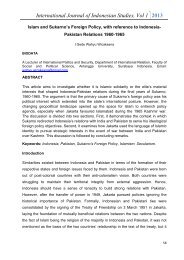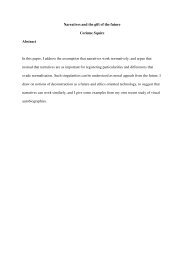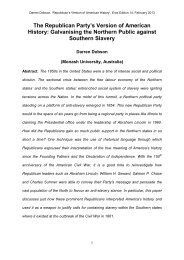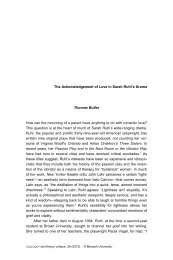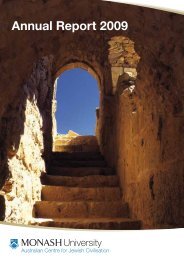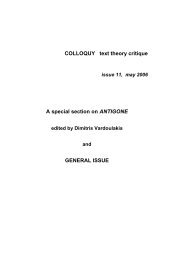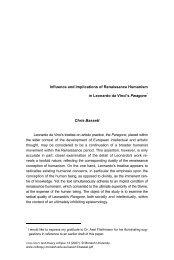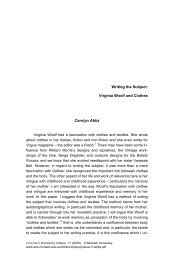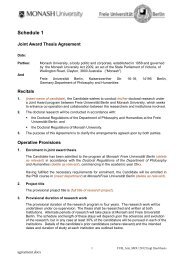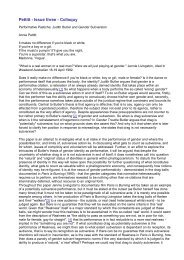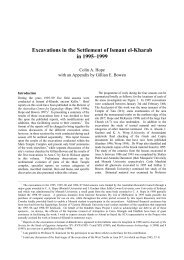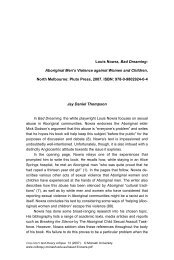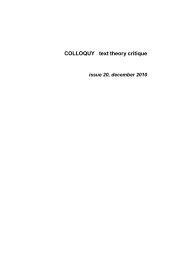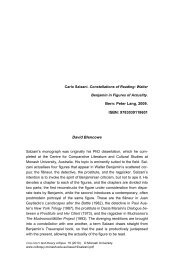Newsletter 57 May 12.pub - Arts - Monash University
Newsletter 57 May 12.pub - Arts - Monash University
Newsletter 57 May 12.pub - Arts - Monash University
Create successful ePaper yourself
Turn your PDF publications into a flip-book with our unique Google optimized e-Paper software.
MCJLE NEWSDirector’s Message<strong>May</strong> 2012Inside this issue:Dear Sensei-gata,MCJLE National Symposium2This year marks the 15 th year of operation for the Melbourne Centre for Japanese LanguageEducation. It will also be an important year for Japanese language education ingeneral as the development of the Japanese component of the Australian Curriculumcommences and the MCJLE together with the Japan Foundation, Sydney will hold a nationalsymposium for Japanese Language Educators. It has been many decades since anational symposium was held and we believe this is the most relevant time to hold suchan event. With the development of the Australian Curriculum it is time for our professionto take a more national view and look to the future of Japanese language Education.2012 Japan Festival 3JCV Drawing CompetitionJapanese Music andlive Calligraphy3Mami Yamanaka SilentYesterday34The symposium will be held:Venue: The State Library of Victoria, Melbourne CBDDate: 1 and 2 November 2012Details: T.B.AI encourage all teachers and those interested in the future of Japanese language educationto attend this special event. The focus of the symposium will be to share innovativeprograms and best practice from around Australia, in addition to the latest research toinform the teaching of Japanese language and culture, presentations include:The Australian CurriculumJapanese:Moving into the digital ageLanguage outcomes using technologyAdvocacyEngaging students: providing alternative pathwaysJICC Japanese FreeScreeningThe online magazine“Highlighting Japan”Japan in MelbourneWebsiteMainichi ShogakuseiShinbunPD information/CalendarMCJLE Resource PostalService45556-78Professor Joe lo Bianco, Associate Professor Angela Scarino, Professor Chihiro KinoshitaThomson [J-Gap] are confirmed speakers. Other speakers will include international andAustralian experts in JLE.The Japan Foundation Sydney and the MCJLE will offer travel grants to teachers toattend.This event will mark the beginning of a national focus for JLE and provide a platform forlearning, discussion and planning of the future. I look forward to seeing you there.I would like to offer my congratulations to the JLTAV on their 40 th Anniversary. Therecent State Conference and celebratory dinner were very successful and evidence of avery committed and hard working president and committee who provide enthusiasticteachers with relevant professional learning opportunities and support. Congratulations!As the weather turns cooler I hope you avoid the winter bugs and have a productiveterm ahead.MCJLE WIKI 9Study/Travel Grant 10Nihongo Victoria 10Japanese Festivals andEvents11-12Forms 13-20Yours SincerelyAnne de KretserPage 1 http://www.arts.monash.edu.au/affiliates/mcjle/index.html MCJLE News Volume <strong>57</strong>
Melbourne Centre for Japanese Language EducationNational Symposium: Japanese Language Education 2012You are invited to attend the first National Symposium for Japanese Language Education inover 30 years. This symposium will provide a unique opportunity for teachers to learn aboutinitiatives and issues on a national scale and to share best practice and discuss issues.Date: 1 and 2 November 2012Time: 9-5pmVenue: State Library VictoriaCost: $150.00 per dayGuest speakers include:Professor Joe lo Bianco, Associate Professor Angela Scarino,Professor Chihiro Kinoshita Thomson [J-Gap]Presentations include:The Australian Curriculum and JapaneseMoving into the digital age, language outcomes using technologyEngaging students: providing alternative learning pathwaysProfessional learning and support initiativesAdvocacy in and out of the classroomMajor Supporter: The Japan Foundation, SydneySponsors welcomePlaces limited, please register early!Register your interest: arts-mcjle@monash.eduThe MCJLE is funded by the Nippon FoundationThe Melbourne Centre for Japanese Language Education isfunded by an endowment from the Nippon Foundation with theoverall program administered by the Tokyo FoundationPage 2 http://www.arts.monash.edu.au/affiliates/mcjle/index.html MCJLE News Volume <strong>57</strong>
2012 Japan FestivalDate & Time Sunday 20th <strong>May</strong> 2012VenueBox Hill Town hall & Box Hill TAFE1000-1022 Whitehorse Road, Box Hill (Melway:47D9)Entry Fee $5.00Free Entry Children up to Grade 6; and Disabled persons(+attendant)Performances Taiko Drums, Japanese Dances, Kendo, Karate, Shakuhachi, TsugarujamisenKimono Contest, Cosplay Contest, Singing Competition, Trivia Quiz Show etcSpecial Events Cosplay Contest; SumoDisplaysBullet train (shinkansen) Model Rail, Ikebana, Bonsai, etcDemonstration Tea Ceremony, Go, Origami, Traditional Japanse Games, etcStallsSushi, Takoyaki, Yakitori, Fairy Floss, Japanese Cakes, Tea, Japanese Toys,’China, Books, Craft, Kimono, Balloon Yoyo Games, and lots moreRaffleGorgeous PrizeFor more information http://www.jcv-au.org/japanfestival/Japan Club of Victoria Drawing CompetitionAs part of this year's Japan Festival, the Japan Club of Victoria is holding its annual drawing competition. The competition is open to school students, with two divisions; one division for primary schoolentrants and one for high school entrants. Announcement of the best three entries from each divisionand the awarding of prizes will take place at the Japan Festival in Box Hill on Sunday 20 <strong>May</strong>2012 at 3:00pm on the Main Stage. All entries will be displayed at the Box Hill TAFE.Entries close on Monday the 30th of April. For more information and details of submission requirementsplease see the http://www.jcv-au.org/japanfestival/In the Flow: Japanese Music and live CalligraphyWorld Music Cafe - Box HillFriday, <strong>May</strong> 11th 2012 8:00pmAnne Norman (shakuhachi), Noriko Tadano (shamisen, song), Toshi Sakamoto (taiko), and Miho Araki(calligrapher) present a beautiful and energetic performance project in celebration of the Whitehorsesister city relationship with the Japanese city of Matsudo. From the driving rhythms of thetaiko drums and tsugaru-jamisen to the folk-melodies of voice and shakuhachi bamboo flute, all interwovenwith the beautiful flow of Japanese calligraphy.Venue:Box Hill Community <strong>Arts</strong> Centre ( more events at this venue)470 Station St, Box HillPrice: $18 full / $12 concBookings: 94171983Page 3 http://www.arts.monash.edu.au/affiliates/mcjle/index.html MCJLE News Volume <strong>57</strong>
Mami Yamanaka Silent YesterdayMami's new solo exhibition, Silent Yesterday, is on view from 17 April - 5 <strong>May</strong>.Mami Yamanaka’s delicate patterns reflect nature’s own action of creation. Like mathematical fractalsthese complex pen and ink drawings astound with their sense of perfection and intricacy. Commencingwith one singular dot on paper Yamanaka’s marks draw ever outward in a meticulous displayof meditation and patience. This play of form and patterning allows the viewer to enter into theprocess of creation as our eyes trace the hand and mind of the artist.‘For me, pattern making always represents creating something new, and the pattern will expand andcontinuously grow if I keep drawing with a circular motion outward. I believe we all create somethingnew for our life starting from a tiny dot, and it will continuously grow to the extent of what wewould like it to be.’Japanese born and Melbourne based, Yamanaka deals with the pattern with the same sensitivity forwhich traditional Japanese design is best known. Drawing in circular motions and incorporating formsthat symbolise the artist’s experience of migration, these intricate forms both reflect the fragilityof nature and the abundance of inner experience. Animal silhouettes found in her work representboth our fears and anxieties and also a sense of hope - the possibilities of personal freedom andcontinuous renewal.'I have always drawn patterns....they have changed over the years by reflecting my own life experience.I have always been interested in a possible connection between my pattern and the shapes ofnature. Since migrating to Australia, my patterns have started combining memories of both theJapanese and Australian environments that I have experienced. I am exploring the connection betweenmy patterns and particular environments and their memories.'JICC Free Japanese Film ScreeningEnglish Title: Fukushima Hula Girls (PG)Japanese Title: 『がんばっぺフラガール!』(PG)Year: 2011Director: Masaki Kobayashi画 映 ドキュメンタリーWhen: Wednesday, 23 <strong>May</strong>; 5.30pm-7.45pm* No entry after 5.50pm due to security restrictions.Venue: JICC, Consulate-General of Japan, Level 8, <strong>57</strong>0 Bourke Street, MelbourneEntry: Free. Bookings essential.To RSVP, email meljapan@mb.mofa.go.jp.Page 4 http://www.arts.monash.edu.au/affiliates/mcjle/index.html MCJLE News Volume <strong>57</strong>
The online magazine “Highlighting JAPAN”The online magazine Highlighting JAPAN is published once a month by the Japanese Government to help readersbetter understand Japan today.http://www.gov-online.go.jp/eng/publicity/book/hlj/index.htmlJapan in Melbourne WebsiteJapan In Melbourne is a portal site which connects Japan with Melbourne!What is “Japan In Melbourne”?“Japan In Melbourne”is the first portal site in Melbourne which introduces various kinds of Japaneseculture. News related to Japan, restaurants, shops, business activity, product information areintroduced using articles and videos.Who is “Japan In Melbourne” for?Australians who like Japan, who have been to Japan, who want to visit Japan and who are interestedin Japanese food, Japanese language, and Japanese culture...it's for everyone!Website located at www.japaninmelbourne.com.auNew resource in the MCJLE Resource CollectionAs a trial, we now have "Mainichi shogakusei shimbun" as part of MCJLE Resource Collection.(<strong>Monash</strong> Matheson Library, Clayton Campus)This is a daily newspaper and we have edition from the 22nd August 2011.“Mainichi shogakusei shimbun” is a Japanese daily newspaper aimed for Japanese primary school studentsto read, learn and enjoy just like the adults do. Furigana above the kanji makes it easy readand to learn new kanji characters as you read through it. Topics and news are easy to follow and explainedwell at a level which could suit secondary L2 learners of japanese. News is from everydaylife in Japan together with different topics selected day by day from culture, history, sports, seasonsand many more. “Mainichi shogakusei shimbun” is kept in the MCJLE collection, 1 st floor, Main inMatheson Library. It is not for loan but you can browse and photocopy articles that you are interestedin.Article topics are listed in the WIKI (MCJLEbenrichou) under 毎MCJLE Contacts生 新 聞 ダイジェスト. 学 小 日Anne de Kretser, DirectorMonday, Tuesday and ThursdayTel : 03 9905 2313 Fax 03 9905 3874anne.dekretser@monash.eduHiroko Liu, Administrative AssistantMonday, Thursday and Friday9:00am to 2:30pm Tel : 03 9905 9478hiroko.liu@monash.eduarts-mcjle@monash.eduAddress: c/o Japanese Studies Centre, Building 54, <strong>Monash</strong> <strong>University</strong>, Victoria 3800Page 5 http://www.arts.monash.edu.au/affiliates/mcjle/index.html MCJLE News Volume <strong>57</strong>
Professional Development 20124 Day Seminar series for First time teachers of Year 11 and 12 JapaneseSecond Language (*Application form is on page 13)This seminar series is designed to help teachers navigate through teaching VCE for the first time.Teachers may attend one, some or all seminars but it is recommended that if possible all seminarsare attended.The seminars will explain:workshop writing outcomes and SACsdevelop strategies for preparing students for examinations[Teachers are welcome to attend both the Year 11 and Year 12 sessions or just those relevant tothem in 2012]Day3: Monday 18 th June 2012 (Ref No. JUN1812)Year 11 & 12 :Year 11 & 12 :9.30am – 12.30pmDeveloping reading, writing, listening and speaking skills1.30pm - 4.30pmWhat, when and how…The detailed studyDay 4: Friday 24 th August 2012 (Ref No. AUG2414)Year 12 : 1pm - 4:30pmYear 12 examination technique….How to prepare students for the examinationsCost : $44.00/Day $33.00(24th August)Provided : Parking Permit and lunchFirst Year Out Discussion Group 2012 (*Application form is on page 14 )First Year Out teachers are encouraged to attend the monthly seminars specifically designed tocater to their needs and help them to develop strategies to cope with the challenges of being a firstyear out teacher. The seminars also provide a good opportunity to network with other teachers.Time : 5:30pm to 7pmVenue : Japanese Studies Centre, <strong>Monash</strong> <strong>University</strong>, Clayton CampusCost : Free of charge29 th <strong>May</strong> 2012 Assessment methods and tasks26 th June 2012 Strategies and activities for the classroom24 th July 2012 Role Plays and skits, the easy way28 th August 2012 Developing language skills [reading, writing,listening speaking]18 th September 2012 Strategies and activities for the classroom23 rd October 2012 Motivating students, helping students to preparefor tests and exams20 th November 2012 Preparing for an efficient and organised secondyear of teachingPage 6 http://www.arts.monash.edu.au/affiliates/mcjle/index.html MCJLE News Volume <strong>57</strong>
Professional Development Calendar 2012Title Ref. No. Date Time Suitable for Cost Closing Date<strong>May</strong> 2012First time teacher ofYear 11 and 12 JapaneseMAY2812 Mon 28th 9:30am-4:30pmFirst time teachersof Year 11 & 12$33.00 14/<strong>May</strong>/12First Year Out DiscussiongroupMAY2912 Tue 29th 5:30pm-7pmFirst Year outteachersFree ofCharge22/<strong>May</strong>/12June 2012First time teacher ofYear 11 and 12 JapaneseJUN1812 Mon 18th 9:30am-4:30pmFirst time teachersof Year 11 & 12$33.00 4/Jun/12First Year Out DiscussiongroupJUN2612 Tue 26th 5:30pm-7pmFirst Year outteachersFree ofCharge19/Jun/12July 2012First Year Out DiscussiongroupJUL2412 Tue 24th 5:30pm-7pmFirst Year outteachersFree ofCharge17/Jul/12August 2012First time teacher ofYear 11 and 12 JapaneseAUG2412 Fri 24th 1pm-5pmFirst time teachersof Year 11 & 12$22.00 10/Aug/12First Year Out DiscussiongroupAUG2812 Tue 28th 5:30pm-7pmFirst Year outteachersFree ofCharge21/Aug/12September 2012First Year Out DiscussiongroupSEP1812 Tue 27th 5:30pm-7pmFirst Year outteachersFree ofCharge11/Sep/12October 2012First Year Out DiscussiongroupOCT2312 Tue 16th 5:30pm-7pmFirst Year outteachersFree ofCharge16/Oct/12November 2012First Year Out DiscussiongroupNOV2012 Tue 20th 5:30pm-7pmFirst Year outteachersFree ofCharge13/Nov/12Page 7 http://www.arts.monash.edu.au/affiliates/mcjle/index.html MCJLE News Volume <strong>57</strong>
MCJLE Resource Collection Borrowing Postal Service*For Interstate/Country/Outer Metropolitan Melbourne TeachersThe MCJLE Resource Collection is available to all schools. The collection is quite substantial in sizeand so we can support the inclusion of interstate (SA & TAS) schools and country schools througha postal service.Schools in Melbourne are also be able to use the service.The collection which is managed by the Asian Studies Research Library staff and in particular, theJapanese librarian, Ms. Ayako Hatta, work cooperatively with the MCJLE to collectively borrow andpost out materials to schools.Teachers can use the online catalogue to decide which materials they wish to borrow.The selected materials (if available) will be packaged and sent to schools for a two week borrowingperiod.The cost of postage to the school will be borne by the MCJLE the return post must be paid for bythe borrowing school. Teachers are able to borrow, flashcards, printed and multi-media materials.Big books and posters cannot be borrowed. Teachers may only borrow 8 items at a time.How it works??1. Teachers look at the on-line catalogue2. Teachers choose items relevant for their purpose3. Teachers write the name of the item and call number on the borrowing form [see page 20 ]4. Teachers fax the borrowing form to the MCJLE by Thursday 6pm5. MCJLE processes all requests and forward to the Asian Studies Research Library for processing6. MCJLE picks up and post the items on Mondays7. Borrowing period is three weeks8. Teachers post the items back to the MCJLE9. MCJLE return the items to the libraryThis is a free service HOWEVER any items that are overdue willincur a cost which must be borne by the teacher.How to find Materials1. Go to http://library.monash.edu.au/2. Type “MCJLE” in the search box(You will find resources held in the MCJLE Collection)3. Follow the prompts for searching using the catalogue you may only borrow items in the MCJLEResource Collection.* Maximum 8 itemsWe hope that you find this service useful and convenient.We look forward to your feedback regarding it.Page 8 http://www.arts.monash.edu.au/affiliates/mcjle/index.html MCJLE News Volume <strong>57</strong>
Join our Wiki!!!!MCJLE BenrichouAvailable to all teachers of Japanese.2The Melbourne Centre for Japanese Language Education has established a Wiki for teachers ofJapanese. The Wiki is maintained by the MCJLE for teachers and the information placed there ischecked for its appropriateness and relevance.Information can be placed on the Wiki by teachers for the purpose of sharing with other teachers.The MCJLE benrichou is designed to complement the Nihongo Victoria E-mail group. It is for postinginformation useful to others for an extended length of time NOT for asking questions or advertisingupcoming events, please continue to use NVEG for that.What, Why, Who, How is WikiWhat?A Wiki is a secure, managed, space on the internet where members of that Wiki can share informationon certain subjects. The tool used is workspaces for teachers.Why?Many teachers find and want to share useful websites, information and teaching activities, ideas andstrategies. A Wiki is a convenient place to post and store that information electronically in an organisedmanner. Members can easily access information and or post information for other teachers toaccess.Who?Any teacher of Japanese who would like to become a member. Registration is essential and teachersmust provide their name, school and their chosen user name before they will be given permission toaccess the MCJLE Wiki.How? THIS IS A FREE SERVICE [Step by step Guide]1. Teachers get onto the wikispaces for teachers page and registerhttp://www.wikispaces.com/site/for/teachers2. Teachers send an e-mail requesting an invitation to join the MCJLE benrichou Wiki, to theMelbourne Centre for Japanese Language Education with the following information:NameSchoolPrefered e-mail addressUser nameSend the e-mail to mcjle@arts.monash.edu.au3. The MCJLE will then send an invitation through wikispaces for you to join our specific Wiki.4. You will be notified by wikispaces when the invitation has been issued.5. Start using the MCJLE benrichou WIKI6. Let us know if there is anything we can do to improve our wiki or if you would like more pages[topics] addedPage 9 http://www.arts.monash.edu.au/affiliates/mcjle/index.html MCJLE News Volume <strong>57</strong>
Study Grant/Travel GrantStudy GrantAll qualified teachers of Japanese in Victoria, South Australia and Tasmania are invited to apply fora study grant to assist with the cost of undertaking post graduate studies related to the teachingof Japanese. The MCJLE offers grants of up to $1,000 per semester to teachers wishing to furthertheir studies.All interested teachers should complete the application form on page 15 of this newsletter and faxor e-mail it to the MCJLE.Travel GrantTeachers of Japanese in Victoria, South Australia and Tasmania are invited to apply for travelgrants to ASSIST them with the cost of travelling to seminars or conferences within their ownstate or interstate. Interested teachers should complete the application form on page 16 and fax ore-mail it to the MCJLE.Teachers, please be advised that payment can only be made after documentation verifying attendanceat the nominated conference or seminar is received by our office.Using Nihongo Victoria E-mailALL teachers of Japanese are welcome to join the NVEG. This group is designed to keep teachersnetworked and provide a system by which they can exchange useful information about the teachingand learning of Japanese language, resources, websites, curriculum and extra curricular activities.To ensure that the NVEG is as useful and efficient as possible please avoid posting personalmessages on-line and avoid having conversations on-line.Used properly the NVEG is a useful tool but before hitting ‘reply to all’ consider whether ‘all’need to read the e-mail. This way we avoid in-box over load of e-mails that are not relevantto everyone.If you wish to join the Nihongo Victoria E-mail Group please provide us with the followingdetails .A) If you are currently teaching Japanese at a school or institution in Australia and you will be usingyour school email address (eg. yyyy.zzzz@edumail.vic.gov.au ), send an email message from that emailaccount to arts-mcjle@monash.edu.B) If you are currently teaching Japanese at a school or institution in Australia and you will be usinga personal email address (eg. yyyy.zzzz@yahoo.com etc. ), send an email message from thatemail account to arts-mcjle@monash.edu.Please provide- your name- your school/institution name- your school/institution phone numberto avoid spam messages to the list)C) If you are not currently employed at a school or an institution in Australia, you need a refereewho is currently teaching Japanese at a school or institution. Send an email message from your preferredemail account to arts-mcjle@monash.edu.Page 10 http://www.arts.monash.edu.au/affiliates/mcjle/index.html MCJLE News Volume <strong>57</strong>
Japanese Festivals and EventsTanabata 七 夕7 月 7 日Tanabata, or the Star Festival, is held on the evening of July 7. The festival traces its origins to alegend that the Cowherd Star (Altair) and Weaver Star (Vega), lovers separated by the Milky Way,are allowed to meet just once a year - on the seventh day of the seventh month.Children and adults write their wishes on narrow strips of colored paper and hang them, along withother paper ornaments, on bamboo branches placed in the backyards orentrances of their homes. They then pray hard that their wishes willcome true.The Tanabata festival is thought to have started in China. It was transmittedto Japan during the feudal period and combined with traditionallocal customs to become an official event at the Imperial court. Commonerssoon began observing this festival, with different localities developedtheir own distinctive ways of celebrating.Marin Day 海 の 日 7 月 16 日 (2012年 )The third Monday in July (originally July 20) is Marine Day. It was observed for the first time in1996, after being declared a national holiday a year earlier. Japan now has 15 annual holidays.July 20 was actually designated Marine Commemoration Day way back in June 1941 to mark the returnof Emperor Meiji to the port of Yokohama in 1876 from a trip to northern Japan.But it was not a national holiday, and so a number of ocean-related organizations got together in1991 to seek a holiday for the sea. Thanks to strong public support for the idea, July 20 was finallydeclared a national holiday in 1995 after several years of debate in the National Diet.Until then, there were no holidays in the months of June, July, and August. The Japanese public washappy to gain a day off in the summer months, but the kids were probably the happiest of all, sincethey could now start their summer vacation - which frequently starts on July 21 - one day earlier.Anniversaries of the Dropping of the Atomic BombsHiroshima 広 島 8 月 6 日 Nagasaki 長 崎 8 月 9 日At 8:15 a.m. on August 6, 1945, two U.S. B-29 bomber aircraft appeared in the sky above HiroshimaCity, and one of them dropped a small parachute. Attached to this was the atomic bomb that tookthe lives of over 264,000 residents. More than 90% of the city was damaged by the blast; aroundthe epicenter, nearly all of the people died instantly, and most of the buildings were destroyed withouta trace.Three days later, at 11:02 a.m. on August 9, 1945, another atomic bomb was dropped on NagasakiCity, located at the northwestern tip of Kyushu. This time, the bomb left one third of the city inashes. So far, around 150,000 people have died from the effect of the bomb.Today, the epicenters of both the Hiroshima and Nagasaki blasts have been turned into Peace MemorialParks. Each year on August 6 and 9, respectively, a ceremony is held at each park to rememberthe victims of the atomic bombs and to pray for eternal peace. Not only the residents of thetwo cities, but many Japanese, as citizens of the only nation the atomic bomb was dropped, praysfor a world free of war and nuclear weapons.Page 11 http://www.arts.monash.edu.au/affiliates/mcjle/index.html MCJLE News Volume <strong>57</strong>
Anniversaries of the End of World War II終 戦 記 念 日 8 月 15 日World War II ended only days after the bombs were dropped, on August 15, 1945; Japan acceptedthe Potsdam Declaration by the Allied Powers, thereby surrendering unconditionally. It was in 1931that Japan began fighting in China, and 1941 that it made a surprise attack on the U.S. Navy base atPearl Harbor, Hawaii.August 15 is now a day for remembering those who died in the war, and ceremonies are heldthroughout Japan. War not only takes the lives of countless people, butalso affects everyone in the countries involved, making them unhappy.Therefore, the anniversary of the end of World War II is also a day forthose who experienced the war to tell future generations about theirtragic memories, and for everyone to renew the determination neveragain to repeat such foolishness.Bon Holiday お 盆The Bon Festival is held to pray for the repose of the souls of one's ancestors.It's one of the biggest traditional events during the year, along with New Year's. It'ssometimes called o-bon or urabon. In the past, it was held in the middle of the seventh month on Japan'straditional calendar.Some regions therefore celebrate it in mid-July, although the old date is closer to mid-August.Deceased family members are believed to revisit the homestead during Bon to be reunited withtheir family. To guide the souls back, a small bonfire is lit outside the house. This is called the mukae-bi,or welcoming flame.The house is cleaned and dusted, and fruits and vegetables are offered at family altars. When Bonends, the spirits are sent off with another bonfire, called okuri-bi. Some regions release small lanternsdown rivers or into the sea as part of the okuri-bi ritual.Many Buddhist temples hold a service called urabon'e during this time, and so a lot of people thinkBon is a Buddhist tradition. But historians now think thatindigenous Japanese practices combined with Buddhist conceptsto give shape to the Bon customs observed today.Page 12 http://www.arts.monash.edu.au/affiliates/mcjle/index.html MCJLE News Volume <strong>57</strong>
Professional Development Registration FormFirst Time Teacher of Year 11 and 12 Japanese Second LanguageReference No. Amount Date Closing Date ApplyMAY2812 $44.00 28/05/2012 14/05/2012 JUN1812 $44.00 18/06/2012 04/06/2012 AUG2412 $33.00 24/08/2012 10/08/2012 Total $Name __________________________________________________SchoolSchool Address _________________________________________________________________________________________________Post Code__________TelFax ____________________________E-mail (mandatory) ____________________________________________________Dietary requirement ___________________________________________Parking Permit Request □ Yes □ NoPayment Option□ Cheque (Please send a cheque prior to seminar) W Credit Card□ Request Tax Invoice to schoolPlease send the cheque payable to MONASH UNIVERSITY. ABN 12 377 614 012Credit Card Type □ Visa □ Master Expiry Date: /Card No. □□□□ □□□□ □□□□ □□□□Card Holder’s Name ______________________________________Card Holder’s Signature ___________________________________Complete the application form and return by fax or email to MCJLE.Melbourne Centre for Japanese Language EducationBuilding 54, <strong>Monash</strong> <strong>University</strong> Victoria 3800 Australia Tel (03) 9905 2313 Fax (03) 9905 3874Page 13 http://www.arts.monash.edu.au/affiliates/mcjle/index.html MCJLE News Volume <strong>57</strong>
Professional Development Registration FormFirst Year Out Discussion Group 2012Reference No. Amount Date Closing Date ApplyMAY2912 Free of Charge 29/05/2012 22/05/2012 JUN26/12 Free of Charge 26/06/2012 19/06/2012 JUL2412 Free of Charge 24/07/2012 17/07/2012 AUG2812 Free of Charge 28/08/2012 21/08/2012 SEP1802 Free of Charge 18/09/2012 11/09/2012 OCT2312 Free of Charge 23/10/2012 16/10/2012 NOV2012 Free of Charge 20/11/2012 13/11/2012 Name __________________________________________________SchoolSchool Address _________________________________________________________________________________________________Post Code__________TelFax ____________________________Mobile No. ____________________________________________E-mail (mandatory) ____________________________________________________Dietary requirement __________________________________________Melbourne Centre for Japanese Language EducationBuilding 54, <strong>Monash</strong> <strong>University</strong> Victoria 3800 AustraliaTel (03) 9905 2313 Fax (03) 9905 3874 ABN 12 377 614 012Page 14 http://www.arts.monash.edu.au/affiliates/mcjle/index.html MCJLE News Volume <strong>57</strong>
Study Grant Application FormName Mr/Mrs/Ms __________________________________________________Address _________________________________________________________________________________________________Post Code__________Home/Mobile Telephone number ____________________________________SchoolTelFax ____________________________E-mail ____________________________________________________I have been teaching Japanese for years (including 2010)I am currently teaching at the following year levelsTERTIARY QUALIFICATIONS (Please give details of institution, year of study and results)You may include a copy of your academic record for this section. Also detail any additional coursesyou have completed. Clearly state whether or not you have a major in JapaneseThe course for which I am enrolled in/wish to enrol in and for which the scholarship will be used:_____________________(provide details including cost of the course/subject and union fees).I have/have not received financial assistance to undertake studies from any fund/institution orplease detail:_______________________________________________________________________The information given in this application is accurate.Signed: ______________________________________ Date: ______________________Attach a letter to accompany this application form outline the personal and professional benefitof your chosen course/subject and the benefit to the Japanese teaching community.Application forms and accompanying letter must be returned by mail to Anne de Kretser :Melbourne Centre for Japanese Language EducationBuilding 54, <strong>Monash</strong> <strong>University</strong>, Vic. 3800Tel (03) 9905 2313 Fax (03) 9905 3874Email : Anne.DeKretser@monash.eduMCJLE Office Use OnlyAuthorised Signature_________________________Amount$_______________________Date / /Page 15 http://www.arts.monash.edu.au/affiliates/mcjle/index.html MCJLE News Volume <strong>57</strong>
Country & Interstate PD Travel Grant Application FormThe Melbourne Centre for Japanese Language Education recognizes that country and interstate teachers are oftenprohibited from attending seminars/conference in Melbourne due to the cost of travelling. We are pleased, therefore,to offer teachers travel grants to assist with these costs.Travel grant applications are carefully considered; teachers will be advised in writing as to the success/not, of theirapplication. Grants will be forwarded to teachers after attendance at their chosen conference/seminar.Applications must be received at least 4 weeks prior to the conference/seminar you are attending.Please complete all sections of the following application form._________________________________________________________________________________________________________________________________________Name Mr/Mrs/Ms __________________________________________________SchoolSchool Address _________________________________________________________________________________________________Post Code__________TelFax ____________________________E-mail ____________________________________________________Number of kilometres (one way) from your School to Conference or Seminar;*Are you attending the conference or PD with a colleague ? Yes □ No□If YES: Whose car will be used for travel to the conference or PD.Mode of travel ____________________________________I wish to receive a travel grant to assist me with costs to attend:KmConferenceVenue__________________________________________________________________________________________Organized by _____________________________________________Date_____________________________________________I am a full time teacher □I am a part time teacher □I teach at ____________________ level. I have been teaching Japanese for _______years.Have you ever received a travel grant from the MCJLE? Yes □ No□If Yes, please detail when and for which conference.When ____________________, Conference _____________________________________Are you receiving any financial assistance from another source/institution to attend this conference? Yes □ No□Please return this application form by fax to ;Anne de Kretser Fax 03 9905 3874MCJLE Office Use OnlyAuthorised Signature_______________________Amount$______________________Date / /Page 16 http://www.arts.monash.edu.au/affiliates/mcjle/index.html MCJLE News Volume <strong>57</strong>
REALIA BOXTeacher Borrowing Form(Victoria Only)Box No. Details of each box on our websitehttp://www.arts.monash.edu.au/affiliates/mcjle/realia-boxes/index.htmlTitle:Name Mr/Mrs/Ms ________________________________________________School________________________________________________Address: _____________________________________________________________________________Post Code _____________Tel: _______________________ Tel (Home/Mobile) : _______________________Fax: _________________________Email: ____________________________________Deposit ($50 per box) : Paid ReimbursedBox borrowed for __________ weeksDate borrowed _______________, Date to be returned _______________I ________________________of ________________________(school) understand that my$50 deposit will only be returned in full on the return of all borrowed items inMCJLE Authorised Signature __________________________________________Date ________________________Complete the application form and return by fax .Anne deKretserMelbourne Centre for Japanese Language EducationTel (03) 9905 2313/(03) 9905 9478Fax (03) 9905 3874Page 17 http://www.arts.monash.edu.au/affiliates/mcjle/index.html MCJLE News Volume <strong>57</strong>
MCJLE Resources Purchase FormSchool Name ______________________________________________________Address _______________________________________________________________________________________________ Post Code __________Tel _________________________Fax _________________________E-mail _________________________________________Name of teacher applying Mr/Mrs/Ms__________________________________________□Listening Tasks for Senior school Students of JapaneseAUD$44.00 (GST included)□らくらくMCJLE CD-Rom Audio Databank for Senior Students of Japanese□Year 10 Listening material ( 高1 年 校) 生AUD$44.00 (GST included)AUD$27.50 (GST included)□Writing Rules!! A Text Type Guide for Senior Secondary StudentsHow many copies? (Writing Rules!!)______________AUD$6.60 (GST included)Kaiwa Sura Sura KitAUD$55.00(GST included)TOTAL AMOUNT $__________________Payment Option□Cheque □ Credit Card □Request Tax Invoice *ABN No. ___________________Please send the cheque payable to MONASH UNIVERSITY.Credit Card TypeCard No.Expiry Date: /□Visa □Master□□□□ □□□□ □□□□ □□□□+Card Holder’s Name ___________________________________________□ KittoCard Holder’s Signature ________________________________________Complete the application form and return by fax or mail to MCJLE.Anne de Kretser Fax 03 9905 3874MCJLE Office Use OnlyMelbourne Centre for Japanese Language EducationShipped / /Building 54, Japanese Studies CentrePayment / /<strong>Monash</strong> <strong>University</strong>, Victoria 3800 Australia ABN 12 377 614 012Page 18 http://www.arts.monash.edu.au/affiliates/mcjle/index.html MCJLE News Volume <strong>57</strong>
MCJLE Resource Collection Borrowing Card Application Form 2012(Victoria only)School _______________________________________________________Primary □Secondary □Address __________________________________________________________________________________________Post Code_________________TelFax ____________________________E-mail ____________________________________________________Name of teacher applying Mr/Mrs/Ms________________________________________Name(s) of other Japanese Teaching staffYour Levels at which Japanese is taught : PLEASE INDICATE THE NUMBER OF STUDENTStaught at each levelPrep One Two Three Four Five Six Seven Eight Nine Ten Eleven TwelveTotal number of students studying Japanese ____________________Estimated need to visit the Resource CentreWeekly □ Monthly□ Fortnightly □ Other □Please return this application from by fax toAnne de KretserMelbourne Centre for Japanese Language EdcuationTel (03) 9905 2313/(03) 9905 9478Fax (03) 9905 3874Page 19 http://www.arts.monash.edu.au/affiliates/mcjle/index.html MCJLE News Volume <strong>57</strong>
MCJLE Resource Collection Postal Borrowing ServiceSchool _______________________________________________________(Mandatory)Primary □Secondary □Address _________________________________________________________(Mandatory)_________________________________Post Code_________________Tel (Mandatory) Fax ____________________________E-mail ____________________________________________________(Mandatory)Name of teacher applying Mr/Mrs/Ms ___________________________________(Mandatory)Name (Books/DVDs)Call NumberThe form to the MCJLE by Thursday 6pmPost the items on MondaysPlease return this application from by fax toAnne de KretserMelbourne Centre for Japanese Language EdcuationTel (03) 9905 2313/(03) 9905 9478Fax (03) 9905 3874MCJEL Office Use OnlyFax receivedRequested to M.L/ // /Posted/ /Returned/ /Page 20 http://www.arts.monash.edu.au/affiliates/mcjle/index.html MCJLE News Volume <strong>57</strong>



